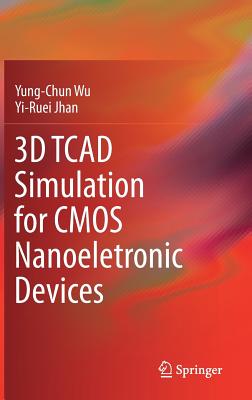Advanced CMOS Biochips: Design and Fabrication
暫譯: 先進CMOS生物晶片:設計與製造
Ghafar-Zadeh, Ebrahim, Forouhi, Saghi, Azadmousavi, Tayebeh
商品描述
Biochips incorporate a verity of means including electronic, photonic and microfluidic devices; biological materials (living cells, tissue, enzymes, nucleic acid and etc.) and chemical analysis to produce the detectable signals for identification of biological phenomena. Among several competing biochip technologies, Complementary Metal Oxide Semiconductor (CMOS) process offers the advantages of low cost, integrated, high precision and portable techniques suitable for point-of-care diagnostics.
Advanced CMOS Biochip takes multi-path approach: microelectronic design and implementation of bio-interfaces offering a vital contemporary view of a wide range of integrated circuits and system for electrical, magnetic, optical and mechanical sensing and actuating blocks and much more; classical knowledge of biology, biochemistry as well as microfluidics. The coverage is both practical and in depth integrating experimental, theoretical and simulation examples. By using AdvancedCMOS Biochip, readers will have the fundamentals and design techniques to grasp the situation which arise typically in CMOS biochip devices.
商品描述(中文翻譯)
生物晶片結合了多種手段,包括電子、光子和微流體裝置;生物材料(活細胞、組織、酶、核酸等)以及化學分析,以產生可檢測的信號來識別生物現象。在幾種競爭的生物晶片技術中,互補金屬氧化物半導體(CMOS)工藝提供了低成本、集成、高精度和便攜的技術優勢,適合於臨床診斷。
《先進CMOS生物晶片》採取多路徑的方法:微電子設計和生物介面的實現,提供了當代廣泛集成電路和系統的關鍵視角,涵蓋電氣、磁性、光學和機械感測及驅動模塊等更多內容;同時結合生物學、生物化學以及微流體學的經典知識。內容既實用又深入,整合了實驗、理論和模擬的範例。通過使用《先進CMOS生物晶片》,讀者將掌握CMOS生物晶片裝置中典型情況的基本原理和設計技術。
作者簡介
Ebrahim Ghafar-Zadeh received his BSc and MSc in Electrical Engineering from KNT University (1995) and Tehran University (1997), both in Tehran. From 2004 to 2008, he pursued his PhD studies at École Polytechnique de Montréal (Montreal, Canada). In 2008, Dr. Ghafar-Zadeh received several postdoctoral fellowship awards, including the PDF NSERC Canada and PDF FQRNT Quebec, which allowed him to continue his research in CMOS biochip design in the Departments of Electrical Engineering and Bioengineering at McGill University and the University of California, Berkeley. In 2023, he joined the Department of Electrical Engineering and Computer Science at the Lassonde School of Engineering, York University, where he is currently an Associate Professor and directs a biologically inspired Sensors and Actuators (BioSA) laboratory. His research is supported by NSERC Canada, CIHR, Mitacs, and other funding agencies in Canada. Dr. Ghafar-Zadeh's research focuses on CMOS sensors, artificial intelligence (AI)-based sensing mechanisms, and point-of-care diagnostics. To date, he has trained more than 60 highly qualified personnel and published over 200 papers in conferences and journals, as well as four books on the topic of CMOS sensor.
Saghi Forouhi earned her B.Sc. and M.Sc. degrees in Electronics Engineering from Guilan University, Iran, in 2010 and 2012, respectively. She received her Ph.D. from Isfahan University of Technology (IUT), Iran, in 2019, through active collaboration between IUT and York University, Canada. She subsequently continued her work with York University as a research associate and postdoctoral researcher. She also worked as a research associate in collaboration with York University and the University of Calgary in Canada. She later joined the Department of Electrical Engineering (ISY), Division of Electronics and Computer Engineering (ELDA), at Linköping University, Sweden. Her research focuses on CMOS analog and mixed-signal integrated circuits, particularly integrated sensors and biosensors.
Tayebeh Azadmousavi earned both her B.Sc. and M.Sc. degrees in electronic engineering from Urmia University, located in Urmia, Iran, in 2011 and 2013 respectively. She later achieved her Ph.D. degree in electronic engineering from Sahand University of Technology in Sahand New Town, Tabriz, Iran, in 2019. During her academic journey, Dr. Azadmousavi's exceptional accomplishments stood out. She was notably recognized as a distinguished Ph.D. researcher by the Faculty of Electrical Engineering at Sahand University of Technology in 2019. Additionally, she secured the distinction of being the top Ph.D. graduate from Iran's National Elites Foundation in the same year. Currently serving as an Assistant Professor at the University of Bonab in Bonab, Iran. Her research pursuits encompass a diverse array of topics, including low voltage/low power analog and digital integrated circuits, analog integrated circuits operating in current mode and voltage mode, wireless RFIC design, as well as the innovative field of biosensors.
作者簡介(中文翻譯)
Ebrahim Ghafar-Zadeh 於1995年和1997年分別在德黑蘭的KNT大學和德黑蘭大學獲得電機工程的學士和碩士學位。從2004年到2008年,他在加拿大蒙特利爾的蒙特利爾理工學院進行博士研究。2008年,Ghafar-Zadeh博士獲得多項博士後獎學金,包括PDF NSERC Canada和PDF FQRNT Quebec,這使他能夠在麥吉爾大學和加州大學伯克利分校的電機工程和生物工程系繼續進行CMOS生物晶片設計的研究。2023年,他加入約克大學拉松德工程學院的電機工程與計算機科學系,目前擔任副教授並負責一個生物啟發的傳感器與致動器(BioSA)實驗室。他的研究得到了NSERC Canada、CIHR、Mitacs及其他加拿大資助機構的支持。Ghafar-Zadeh博士的研究重點是CMOS傳感器、基於人工智慧(AI)的感測機制以及即時診斷。迄今為止,他已培訓超過60名高素質人員,並在會議和期刊上發表了超過200篇論文,以及四本有關CMOS傳感器的書籍。
Saghi Forouhi 於2010年和2012年分別在伊朗吉蘭大學獲得電子工程的學士和碩士學位。她於2019年在伊朗伊斯法罕科技大學(IUT)獲得博士學位,這是通過IUT與加拿大約克大學的積極合作實現的。隨後,她繼續在約克大學擔任研究助理和博士後研究員。她還曾與約克大學和加拿大卡爾加里大學合作擔任研究助理。之後,她加入瑞典林雪平大學的電機工程系(ISY),電子與計算機工程部(ELDA)。她的研究重點是CMOS類比和混合信號集成電路,特別是集成傳感器和生物傳感器。
Tayebeh Azadmousavi 於2011年和2013年分別在伊朗烏爾米亞大學獲得電子工程的學士和碩士學位。她於2019年在伊朗塔布里茲的Sahand科技大學獲得電子工程的博士學位。在她的學術旅程中,Azadmousavi博士的卓越成就引人注目。她在2019年被Sahand科技大學電機工程系認定為傑出的博士研究員。此外,她在同年獲得伊朗國家精英基金會的最佳博士畢業生榮譽。目前,她在伊朗Bonab大學擔任助理教授。她的研究範疇涵蓋多個主題,包括低電壓/低功耗的類比和數位集成電路、以電流模式和電壓模式運作的類比集成電路、無線RFIC設計,以及創新的生物傳感器領域。











